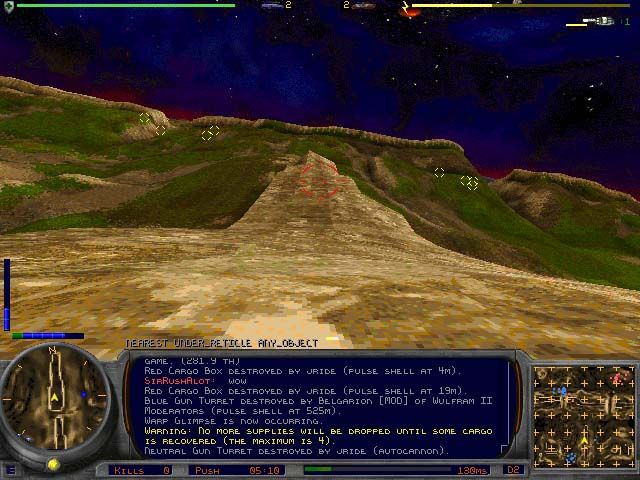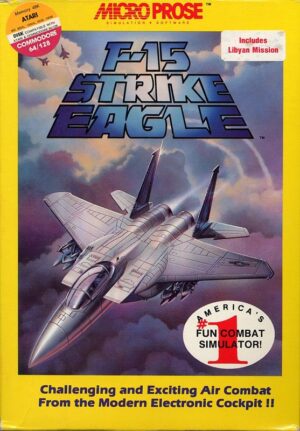Retro Replay Review
Gameplay
Wulfram II delivers a dynamic blend of strategy and first-person tank combat that keeps you engaged from the moment you hover onto the battlefield. The mechanics are intuitive: you pilot a hovering vehicle armed with cannons, missiles, and deployable shields, each serving a critical role in both offense and defense. The learning curve is gentle enough for newcomers yet deep enough to satisfy veteran tacticians, as you balance resource gathering, base assaults, and supporting your teammates in real time.
(HEY YOU!! We hope you enjoy! We try not to run ads. So basically, this is a very expensive hobby running this site. Please consider joining us for updates, forums, and more. Network w/ us to make some cash or friends while retro gaming, and you can win some free retro games for posting. Okay, carry on 👍)
Matches in Wulfram II often feel like a carefully choreographed dance between two factions—the Crimson Federation and the Azure Alliance. Each side deploys players as the proverbial “cannon fodder,” and success hinges on coordinated strikes against enemy bases as well as opportunistic skirmishes with opposing hover tanks. The familiar “capture and defend” objectives intertwine with base-destroying goals, ensuring that every skirmish, ambush, or flanking maneuver can turn the tide of war.
One of the game’s standout features is its resource-management layer: hover vehicles collect energy orbs scattered across maps, which you then funnel into upgrading your firepower, armor, or support modules. Deciding whether to safeguard your orb-gatherers or push for a surprise base assault adds a strategic depth that few free online games achieve. Team composition also matters—some players specialize in swift hit-and-run tactics, while others take on the role of mobile artillery platforms or front-line tanks.
Match pacing is well balanced. Early game focuses on scouting and minor skirmishes, mid-game brings in tactical plays such as capturing strategic points, and endgame revolves around all-out assaults on the opposition’s stronghold. Respawn timers and resource cooldowns ensure that matches never drag on too long, while still providing enough breathing room for big plays. Wulfram II proves that compelling strategy can coexist with thrilling first-person action.
Graphics
While Wulfram II may not boast ultra-realistic visuals, its stylized sci-fi aesthetic brings the battlefield to life with clean lines and vibrant faction colors. The Crimson Federation’s deep reds and burning embers contrast sharply with the Azure Alliance’s cobalt blues and neon accents, making it easy to identify friend from foe in the heat of combat. Hover tanks leave distinctive contrails and scorch marks that add cinematic flair to every exchange of fire.
Environments range from dusty desert outposts to frozen tundra bases and volcanic plateau arenas. Each map feels distinct, with environmental hazards that keep you on your toes—sandstorms can obscure vision, ice fields reduce traction, and lava fields occasionally erupt, altering routes and opening new flanking paths. The dynamic weather effects and subtle day-night cycles heighten immersion without taxing system resources.
Performance-wise, Wulfram II runs smoothly on most modern browsers and low- to mid-range PCs, thanks to its optimized engine. Frame rates stay consistently high even when multiple explosions light up the screen. The user interface is clean and minimalist: health bars, ammo counts, and resource meters are displayed unobtrusively, allowing you to focus on piloting and strategic planning rather than wrestling with cluttered HUD elements.
Particle effects for projectiles and explosions are satisfying without being over the top. Hit feedback—sparks on armor, shockwaves on impact—feels responsive and weighty, reinforcing the sense that your hover tank is a formidable machine of war. Although hardcore graphics enthusiasts might crave higher fidelity textures, the game’s cohesive art direction and stable performance make for a pleasing visual package that complements its fast-paced gameplay.
Story
At its core, Wulfram II frames its conflict between the Crimson Federation and the Azure Alliance in broad strokes, emphasizing teamwork and tactical warfare over detailed narrative arcs. Still, bits of lore are woven into loading-screen tips and map descriptions, offering just enough context to make you care about the larger galactic stakes. Each faction’s backstory touches on themes of resource scarcity, political ideology, and frontier conflicts that resonate in today’s strategy titles.
As a grunt pilot, you’re told you’re “cannon fodder,” but you quickly realize that in the hands of skilled players, these hover vehicles are far more than disposable assets. The game’s storytelling leans into this concept: debriefs after major matches hint at strategic victories and losses that ripple across the in-game universe. Your performance isn’t merely a statistic—it influences which faction gains planetary control and shapes the ebb and flow of the ongoing war.
Characterization comes through voice snippets and faction commanders’ orders. Although there are no named heroes to follow, the commanding officers’ tactical directives—ranging from “Secure the energy conduit!” to “Fall back and fortify!”—lend each battle a sense of purpose. You may not know the full saga of Captain Aurelius or General Solaris, but their fervent speeches and tactical priorities inject personality into otherwise abstract skirmishes.
Periodic in-game events introduce seasonal narratives: desert sieges during sandstorm season, arctic incursions when lunar eclipses occur, and more. These limited-time scenarios not only add variety to battlefields but also deepen the game’s lore. Over time, you’ll find yourself invested in whether the Crimson Federation breaches the Azure Alliance’s defensive line on a glacial wasteland or if the Alliance can repel a fierce assault during the volcanic uprising.
Overall Experience
Wulfram II is a shining example of how a free online game can deliver strategic depth, fast-paced action, and engaging visuals without asking players to spend a dime. Its matchmaking system generally pairs you with teammates of similar skill, minimizing frustrating blowouts and ensuring that every match feels meaningful. The combination of hover-tank combat and resource-driven strategy fosters teamwork and emergent tactics that keep you coming back for more.
The learning curve rewards persistence: early defeats teach you map layouts, weapon ranges, and optimal orb collection routes. As you experiment with different vehicle loadouts—prioritizing speed, armor, or heavy firepower—you’ll discover playstyles that suit your temperament and skill level. Cross-faction leaderboards and clan support further enhance longevity, giving competitive players clear goals and social channels to coordinate epic battles.
Community feedback is actively solicited by the developers, resulting in regular balance patches and new content drops. Whether it’s a fresh map, an experimental weapon tier, or quality-of-life improvements driven by player suggestions, the game evolves in response to its audience. This commitment to player-driven updates sets Wulfram II apart from other free-to-play titles that often stagnate after launch.
In sum, Wulfram II offers tremendous value: robust gameplay mechanics, a distinctive art style, an unfolding sci-fi conflict, and an active community. For gamers seeking a strategic FPS experience that won’t cost a cent, this title should be at the top of your must-try list. Whether you’re a lone wolf tactician or a squad-based strategist, Wulfram II provides the tools and the battlefield to prove your mettle.
 Retro Replay Retro Replay gaming reviews, news, emulation, geek stuff and more!
Retro Replay Retro Replay gaming reviews, news, emulation, geek stuff and more!




Reviews
There are no reviews yet.